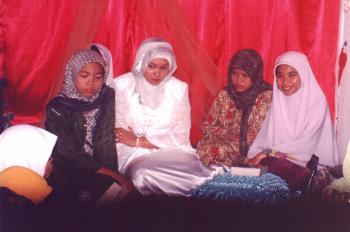Khuluk
Wife requesting for divorce from her husband. This can be done through the agreement between husband and wife. The wife must pay the amount of dowry back to her husband.
Talak ( divorce )
The rule of talak is only hold by the husband. Talak is allowed only for three times. When the husband divorces the wife, he can divorce her by saying I divorce you with talak (one, two or three). If he does say only talak then it means with talak 'one' only. After three times of divorces, the husband and wife can no more remarried to each other except after the wife is divorced by the other person.
Ta'lik
Husband says some condition to his wife such as " if his wife does …….then he will divorce her" or other statements meaning the same, then the wife is divorced directly if she does those things.
Li'an
Husband accuses his wife does adultery with other person and does not have 4 justice witnesses. He has to swear four times in front of public in the name of the most merciful Allah that what he says is true and after that he has to swear one more time saying that if he lie the curse of the Great Allah will be on him. The wife should do the same if she does not commit what her husband swearing of. She has to swear four times with the name of Allah that her husband says is not true. After that she has to swear if her husband is true then the curse of Allah will be on her.
Zihar
If the husband says that his wife's physical ( any part of the body except hair and nails) has similarities with his mother's physical, then the husband is prohibited to have sexual intercourse with his wife except after he does the following :
- Free slaves,
- If he can not effort to free slaves then he has to fast for two months continuously,
- Or else he has to give food to sixty poor people.Women To Whom Marriage is Prohibited
It is permanently haram for a Muslim to marry a woman who belongs to one of the following categories:
(1) The father's wife, whether divorced or widowed. During the period of jahiliyyah such marriages were allowed. Then Islam prohibited them, for once a woman is married to a man's father she acquires the status of his mother, and this prohibition is out of honor and respect for the father. Moreover, as this inviolable prohibition leaves no room for sexual attraction between the son and his step-mother, they are able to develop a relationship of respect and honor.
(2) The mother, including the grandmothers on both sides.
(3) The daughter, including the granddaughters from the son or daughter.
(4) The sister, including the half, and step-sisters.
(5) The paternal aunt, whether she is the real, half, or step-sister of the father.
(6) The maternal aunt, whether she is the real, half, or step-sister of the father.
(7) The brother's daughter, i.e., his niece.
(8) The sister's daughter, i.e., his niece.
All these female blood-relatives are a man's muharramat and he is mahrem to his corresponding female relatives. Marriage to any mahrem whomsoever is permanently prohibited.
